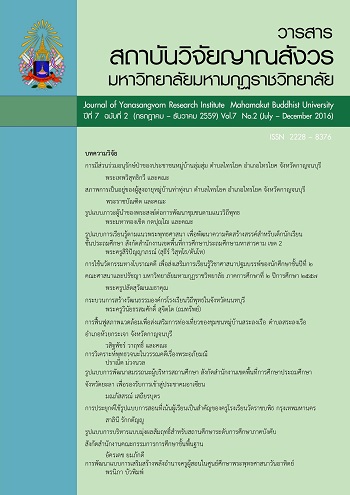COMPETENCIES DEVELOPMENT MODEL OF SCHOOL ADMINISTRATORS UNDER YALA PRIMARY EDUCATIONAL SERVICE AREA SUPPORTING ASEAN COMMUNITY
Main Article Content
Abstract
The purposes of the present study were to build and to assess a capacity development model for school administrators under Yala Primary Educational Service Area Office in preparation for ASEAN Community. The research design Mixed Methods approach: Qualitaive and Quantitative, using systems theory. The research methodology was divided into two steps. The one step included the process of building a capacity development model for the administrators of schools in Yala Province. The other step comprised model development and an assessment of the mentioned model. The subjects were 15 experts consisting of 1. Five scholars holding a doctor’s or a master’s degree in administration and having a position of academicians in administration 2. Five officers whose work involved the policy from Yala Primary Educational Service Area office located in all of the three areas 3. Five basic schools administrators from big-, medium- and small-sized schools by purposive sampling. The research instruments were documents, printed media, electronic media, research papers as well as other various sources, interview, questionnaire, quality verification forms, and assessment forms for the development model. Every step of data collection was done by the researcher. The obtained information was analyzed and grouped through SPSS to gain frequency, percentage, mean and Cronbach's Alpha Reliability Coefficient. The results from the assessment were also analyzed to obtain frequency, percentage and mean. The findings of the study were: 1. To build a capacity development model for school administrators under Yala Primary Educational Service Area Office in preparation for ASEAN Community, it was found that the model which was built by the researcher and could be used for capacity development for the school administrators in Yala Province involved four points as follows: Point 1: Needs for development were composed of the administrative capacity which was awareness building of self-development, connection building, participation, and human relation and team building. It also comprised the communication capacity for using languages such as English, Malay and Chinese. Point 2: Policy implementation was in accordance with the policy of Office of Basic Education Commission and with that of Educational Service Area Office. It was also served with the school policies. The development should focus on building the understanding of ASEAN Community, and the participants should understand and realize on the importance of the administrative capacity and community capacity in preparation for ASEAN Community. Point 3: Development procedure comprised adequate budget, consistent supervision and follow-up, using unfocused-grammar sentences relating to the participants’ jobs, and group agreement making. The participants should be willing to be developed, and they should make comments relating to the development. Mixed group work activities should start from easy parts to more difficult ones. Point 4: Development process consisted of having native speaker lecturers, test taking before, during and after the development, workshops, explicit curriculum together with various curriculum-serving activities, sufficient handbooks and media, suitable time period, four communication skills evaluation, follow-up activities and remedial courses provided by the persons in charge or the lecturers. The whole process should be evaluated by the sample group. 2. To assess a capacity development model for school administrators under Yala Primary Educational Service Area Office in preparation for ASEAN Community, it was found that the assessment results of the capacity development model for school administrators in the above-mentioned area had four aspects which were suitability, utilization, possibility, and accuracy. The assessment results were at the highest level.
Article Details
References
เฉลิมพร วรพันธกิจและศักดา ขจรบุญ. (ม.ป.ป.). สมรรถนะที่พึงประสงค์ของบุคลากรองค์กรปกครองส่วนท้องถิ่นเพื่อรองรับการเป็นประชาคมอาเซียน: กรณีศึกษาในกลุ่มจังหวัดภาคใต้ฝั่งอันดามัน. คณะมนุษยศาสตร์และสังคมศาสตร์ มหาวิทยาลัยราชภัฏภูเก็ต.
โณทัย อุดมบุญญานุภาพ. (2546). “คุณภาพของครูกับอนาคตของประเทศ. ประชาศึกษา.
ทวีวรรณ อินดา. (2552). การพัฒนารูปแบบที่มีประสิทธิภาพของการนำกลยุทธ์ไปปฏิบัติในสถาบันอุดมศึกษาของรัฐ. ดุษฎีนิพนธ์สาขาบริหารการศึกษา บัณฑิตวิทยาลัย มหาวิทยาลัยศิลปากร.
ธัญญา อภิปาลกุล และคณะ. (2545). รูปแบบการพัฒนาผู้บริหารสถานศึกษาเพื่อปฏิรูปการเรียนรู้สถานศึกษา SINTPAE Model (ฉบับสรุป). กลุ่มงานพัฒาวิขาชีพครู สำนักนโยบายแผนและมาตรฐานการศึกษาฯ สำนักงานคณะกรรมการการศึกษาขั้นพื้นฐาน: ห้างหุ้นส่วนจำกัด ภาพพิมพ์.
ธัญทิพ บุญเยี่ยม และ นางสาวทิวาพร ทาวะรมย์. (2556). ทัศนคติต่อความสำคัญของภาษาในอาเซียน. คณะศิลปศาสตร์และวิทยาศาสตร์ มหาวิทยาลัยราชภัฏศรีสะเกษ.
แพรภัทร ยอดแก้ว. (2555). คุณลักษณะของพลเมืองอาเซียนตามกฎบัตรอาเซียน. คณะมนุษยศาสตร์ และสังคมศาสตร์ มหาวิทยาลัยราชภัฏนครปฐม .
ไพศาล วิศาลาภรณ์. (2554). การพัฒนามาตรฐานและยุทธศาสตร์ในการพัฒนาโรงเรียนสู่ประชาคมอาเซียน สังกัดสานักงานคณะกรรมการการศึกษาขั้นพื้นฐาน. กระทรวงศึกษาธิการ.
วราพร ชูภักดี. (2555). สำรวจความคิดเห็นเพื่อการพัฒนาสังคมไทยสู่ประชาคมเศรษฐกิจอาเซียน. แหล่งที่มา http://webcache.googleusercontent.com สืบค้นเมื่อวันที่ 1 พฤษภาคม 2555.
วิทยาลัยนานาชาติ มหาวิทยาลัยราชภัฎสวนสุนันทา. (2556). ภาษาจีนภาษาที่คนทั่วโลกอยากเรียน. แหล่งที่มา http://www.uniggng.com. สืบค้นเมื่อวันที่ 2 พฤศจิกายน 2558.
ศิริจันทร์ พลอยกระโทก. (2551). สมรรถนะทางการบริหารของผู้บริหารสถานศึกษา สังกัดสำนักงานเขตพื้นที่การศึกษาขอนแก่น เขต 5. วิทยานิพนธ์ปริญามหาบัณฑิต สาขาวิชาการบริหารการศึกษา บัณฑิตวิทยาลัย มหาวิทยาลัยขอนแก่น.
ศุภชัย สิงห์ยะบุศย์. (2558). "มมส"เปิดเวทีสร้างเครือข่ายเพื่อนบ้าน ร่วมมือศิลปกรรมศาสตร์สานเจตนารมณ์อาเซียน. แหล่งที่มา http:// www.daily.khaosod.co.th/view_news.php?. สืบค้นเมื่อวันที่ 5 กรกฎาคม 2558
สมชาติ กิจยรรยง และอรจรีย์ ณ ตะกั่วทุ่ง. (2550). เทคนิคการจัดการฝึกอบรมเพื่อพัฒนาบุคลากรอย่างมีประสิทธิภาพ. กรุงเทพฯ : สมาคมส่งเสริมเทคโนโลยี (ไทย-ญี่ปุ่น).
สุภาภรณ์ โกสีย์. (ม.ป.ป.). บัณฑิตที่พึ่งประสงค์. แหล่งที่มา www.hu.ac.th/ academic/ article/... Ideal%20%20Graduate.html. สืบค้นเมื่อ 1 เมษายน 2558.
สำนักงานคณะกรรมการการศึกษาขั้นพื้นฐาน. (2554). การพัฒนามาตรฐานและยุทธศาสตร์ในการพัฒนาโรงเรียนสู่ประชาคมอาเซียน สังกัดสานักงานคณะกรรมการการศึกษาขั้นพื้นฐาน. กระทรวงศึกษาธิการ.
สำนักงานคณะกรรมการการศึกษาขั้นพื้นฐาน. (2557). นโยบายสำนักงานคณะกรรมการการศึกษาขั้นพื้นฐาน. กลุ่มวิจัยและพัฒนา สำนักงานคณะกรรมการการศึกษาขั้นพื้นฐาน, กระทรวงศึกษาธิการ.
สำนักงานคณะกรรมการข้าราชการครูและบุคลากรทางการศึกษา (ก.ค.ศ.). (2548). “มาตรฐานตำแหน่งและมาตรฐานวิทยฐานะ”. หนังสือสำนักงาน ก.ค.ศ. ที่ ศธ 0206.3/ ว17 วันที่ 21 ตุลาคม 2548
สำนักงานคณะกรรมการข้าราชการพลเรือน. (2548). คู่มือสมรรถนะราชการพลเรือนไทย. สำนักงาน ก.พ.; กรุงเทพฯ: พี.เอ.ลีพวิ่งจำกัด.
สำนักงานคณะกรรมการพัฒนาระบบราชการ. (2555). การประชุมสัมมนาทางวิชาการประจำปี 2555 : เรื่อง “ปรับระบบราชการไทย...เตรียมพร้อมสู่อาเซียน 2015. แหล่งที่มา http://www.opdc.go.th/content.php?menu_id=2&content_id=3090 สืบค้นเมื่อวันที่ 10 กรกฎาคม 2558.
สำนักงานเลขาธิการสภาการศึกษา. (2552). ข้อเสนอการปฏิรูปการศึกษาในทศวรรษที่สอง (2552-2561). กรุงเทพฯ : บริษัทพริกหวานกราฟฟิค จำกัด.
หนังสือพิมพ์ไทยโพสต์. (2555). ไทยกับการเตรียมพร้อมสู่ประชาคมอาเซียน ตอน 3. แหล่งที่มา http://www.castu.org/CAS-TU/index. สืบค้นเมื่อวันที่ 5 เมษายน 2013.
อเนก เพิ่มวงศ์เสนีย์. (2554). การบรรยายทางวิชาการเพื่อสร้างความตระหนัก”เรื่อง การก้าวสู่ประชาคมอาเซียน. พิมพ์ครั้งที่ 5. กรุงเทพฯ: สำนักนโยบายความร่วมมือกับต่างประเทศ.
Drago-Severson, E. (2004). Helping teachers learn: principle leadership for adult growth and development. Thousand Oaks, CA : Corwin Press
Hughers, L.W. (1999). The principal as Leader. 2nd ed. New Jersey : Prentice Hall.
Henderson, Iain S. (n.d.). “Managerial Competencies : three dimension to managerial effectiveness?” [Online]. . Available from http:// alummi. Absmba. Com/ablmmi/pdf/managerial competencies. Pdf. Accessed 20 March 2014.
Kevin Kruse. (2004). “Introduction to Instructional Design and the ADDIE Model.” Retrieved [Online].. . Available from http://www. Elearningguru.com/articles /art2_1.htm.
Neubert, John. Mitchell. (1998). A Functional-Based Model Informal Leadershp Perceptions in Intact Work Teams. Dissertation Abstracts international.
Seldin, Peter. (1988). Evaluating and Developing Administrative Performance. San Francisco : Jossey – Bass.
Slocum, john;Jackson, Susan and Hellriegel, Don. (2008). Competency–Based Management. Ohio: South Western Cengage Learning.
Spark & Locks-Horsley . (1989). Education Administration : A Decade of Reform. Thousand. Oaks, C.A : sage.
Spencer L.M. and Spencer S.M. (1993). Competence at Work: Models for Superior Performer. New York: Wiley.


